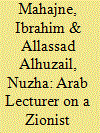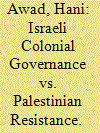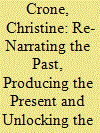| Srl | Item |
| 1 |
ID:
192246


|
|
|
|
|
| Summary/Abstract |
Minority groups tend to experience the academic campus as unpleasant and excluding. Relevant literature attempts to analyze the position of these groups, using terms such as ‘race’ and investigating how higher education institution mechanisms replicate the inequality between the minority group and the hegemonic majority population. In Israel, unresolved problems cause continuing tension between two national groups: citizens who are members of the Palestinian Arab minority (PAMI) and citizens from the Jewish majority. This article focuses on relations between PAMI and Jews on Israeli campuses by drawing upon insights from American research, but it replaces the term ‘race’ with ‘nationality.’ Academe is the only place in Israel where the Arab lecturer is in a position of power vis-à-vis the Jewish student. The study presents this encounter from the viewpoint of the lecturer, drawing on data from interviews with 56 PAMI lecturers in public and private Israeli universities and colleges. The findings indicate that Jewish students use various strategies to divest Arab lecturers of their elevated status in academe.
|
|
|
|
|
|
|
|
|
|
|
|
|
|
|
|
| 2 |
ID:
192244


|
|
|
|
|
| Summary/Abstract |
The use of chemical weapons (CW) by Iraq during the Iran-Iraq War appears to have been subject to far less decisive US responses than similar accusations against Syria during the Syrian civil war. However, the two instances have not yet been subject to direct scholarly comparison. This article treats the Iraqi and Syrian instances as two distinct cases and compares US actions to prevent, investigate and deter CW use on each occasion. After demonstrating that the US responded more decisively to the allegations against Syria, we then employ process tracing to locate both cases within existing theoretical discussions of US intervention in the global South generally, as well as CW norm enforcement in particular. In doing so, we propose that, in addition to other factors including the US aspiration to world dominance and its resultant framing of its material and security interests as well as a lesser regard for citizens of the global South, the anti-US stance of either the CW perpetrator or victim can also affect how the US responds to accusations of CW norm violation. This casts further doubt on the veracity of stated humanitarian motives for US intervention abroad.
|
|
|
|
|
|
|
|
|
|
|
|
|
|
|
|
| 3 |
ID:
192248


|
|
|
|
|
| Summary/Abstract |
This article examines the institutional genealogy of Israeli colonial governance (ICG) and the accompanying patterns of Palestinian resistance in the occupied West Bank and Gaza Strip. It argues that ICG has experienced three phases, each marked by a particular form of direct or indirect colonial rule. Each of these colonial rule forms has been resisted through a distinct pattern of centralized or decentralized collective political agency. I argue that both the form and governing logic of ICG are determined not only by colonialist aims, but also by their interplay with the Palestinian resistance.
|
|
|
|
|
|
|
|
|
|
|
|
|
|
|
|
| 4 |
ID:
192245


|
|
|
|
|
| Summary/Abstract |
This article focuses on Turkey’s crisis-ridden years, from 1973 to 1980. As an under-explored era in English language scholarship, it makes a distinct contribution to the literature on pre-1980 coup Turkish politics. In doing so, it illustrates the implications for the democratic order arising from the two central political leaders of the era Süleyman Demirel and Bülent Ecevit’s tussle for power across the decade. The study draws on fieldwork interviews and critical reading of Turkish and English sources to reveal new insights into the leaders’ actions and decisions that trapped the country in a state of political paralysis, inflamed left-right violence, and politicized state institutions, ultimately dragging Turkey down one of its most turbulent periods. It illustrates how the leaders played crucial roles in shaping conditions that eventually resulted in the termination of multi-party politics with a military coup on 12 September 1980.
|
|
|
|
|
|
|
|
|
|
|
|
|
|
|
|
| 5 |
ID:
192247


|
|
|
|
|
| Summary/Abstract |
This article examines the steep rise in self-confidence among the Arab-Palestinian public in Israel over the last two decades. We suggest that this self-confidence is partially due to higher education levels and the rise of the middle class. We argue that these enhanced levels of human capital have led to more concerted cultural, political and social activism. Our analysis is grounded in the ‘politics of faith’ which we define as a willingness to change the status quo. As such, this article contributes to literature explaining how political and social developments affect collective activism in the public sphere—both within one’s one own community and in relation to the state.
|
|
|
|
|
|
|
|
|
|
|
|
|
|
|
|
| 6 |
ID:
192243


|
|
|
|
|
| Summary/Abstract |
Regaining control of Aleppo was an important symbolic victory for the Syrian state army, which has opened the way for state-sanctioned narrations of ‘post-war’ Syria. To elucidate the workings of this narration, I explore the TV drama Haris al-Quds (2020) as a fascinating window into Syrian state ideology in Bashar al-Assad’s ‘post-war’ Syria. I argue that the Syrian state holds on to future visions of the past while re-narrating history to fine-tune its ideological heritage in a state-endorsed and state-endorsing TV drama. The serial’s interweaving of selected historical times allows for the experience of alternative narrative times, constructing what I refer to as resistance time, Manichaean time, and restoration time. In this play with temporality, each time serves in different ways as a promotion of a particular ideological understanding of Syria.
|
|
|
|
|
|
|
|
|
|
|
|
|
|
|
|